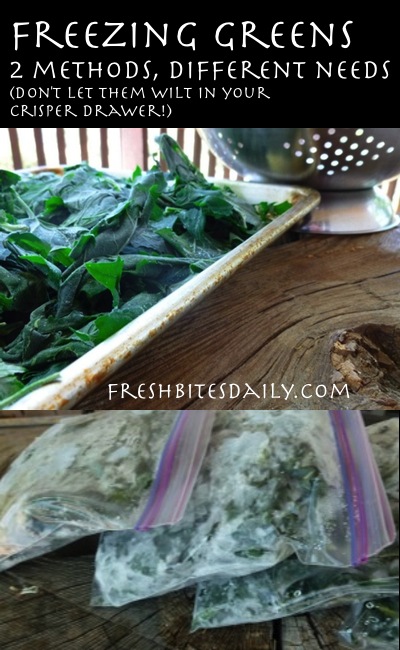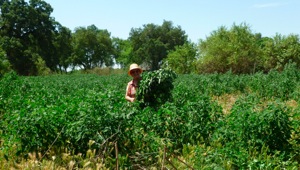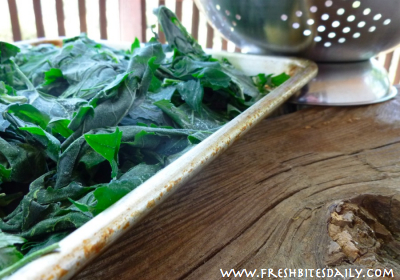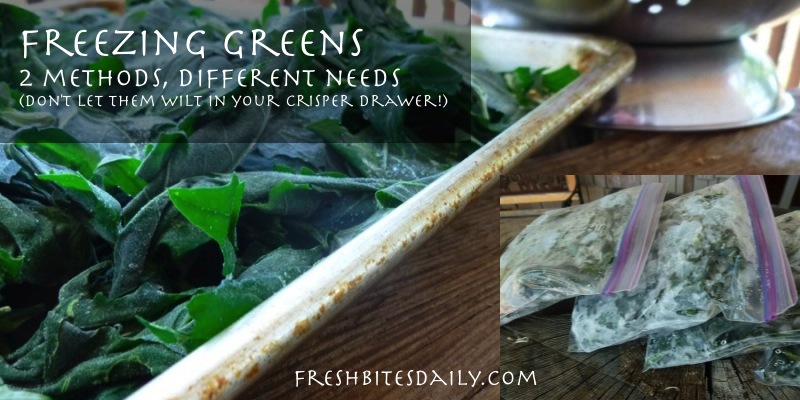How To Freeze Greens (Spinach, Kale, Collards, Swiss Chard and More)
By Amanda Rose | Greens
 Until this spring, we never had the need to preserve garden greens in this household. We easily ate the bit of greens coming out of our garden. We typically consume store-bought greens immediately or end up composting the green slime they turn into. (I am sure we are the only household that does not finish their greens….)
Until this spring, we never had the need to preserve garden greens in this household. We easily ate the bit of greens coming out of our garden. We typically consume store-bought greens immediately or end up composting the green slime they turn into. (I am sure we are the only household that does not finish their greens….)
However, this year we harvested a bumper crop of greens from the spring garden and, around the same time, foraged nearly one hundred pounds of lambs quarters. My fingers are green as I type from plucking the leaves off about 42,000 lambs quarters stems. There were thousands of pounds we left in the field — you can see my mother lost in a sea of these wild greens.
After eating gallons of very green soup, we decided that such abundance would
require a mixed-strategy. There was no way we could eat it all.
We froze about half of our greens collection, part of which was frozen raw and part boiled. The best freezing solution for your greens will depend on your own kitchen management and how you plan to use the greens.
 Freezing greens raw is by far the quicker solution. The raw greens are easy to pop into a soup or stir fry later and will cook quickly. This strategy would be ideal if it were not for the oxalic acid in the greens themselves.
Freezing greens raw is by far the quicker solution. The raw greens are easy to pop into a soup or stir fry later and will cook quickly. This strategy would be ideal if it were not for the oxalic acid in the greens themselves.
Oxalic acid is a mineral inhibitor found in leafy greens, in particular in spinach, collards, lambs quarters, and chard. Oxalic acid will also cause kidney stones, particularly in people prone to kidney stones. If you are using the greens as we do in our extremely green soup, you will want to take measures to reduce the oxalic acid content.
Boiling the greens and discarding the boiling water is by far the best strategy to reduce oxalic acid. (I detail the research on calcium and oxalic acid here.)
If I am freezing greens high in oxalic acid, I freeze them already boiled so that I can just pop them in a soup later. If the greens are just going to add a bit of flavor and texture to a dish, frozen raw greens win for their ease of freezing and convenience in defrosting.
 Freezing greens raw is extremely simple. If you fear that your store-bought greens are headed to
Freezing greens raw is extremely simple. If you fear that your store-bought greens are headed to
green mush and you are pressed for time, this is a great strategy. Simply do the following:
With this method some of your leaves will stick together, but you will be able to pull out a handful pretty easily as you need them.
This is actually my preferred method for high oxalate greens because I end up with quart-sized baggies of cooked greens, enough to add great nutrition to soup, already boiled and ready to use.
With this method, your leaves will freeze in one quart-sized lump. Depending on how you use your greens, consider measuring quantities you typically use into each bag. For instance, fill each bag with two cups of cooked greens.
Of course, you could just make a giant batch of extra green soup and gobble it up. That was our first course of action with our foraging bounty.

Cleaning your garden greens
Leafy Greens: How To Choose, Ideas For Cooking
Your Next Greens Cookbook: Greens, Glorious Greens
Homemade kale chips — Your way, your flavors
An extra-nutritious polenta with some added wild greens
A green salad with a touch of India to break you out of your salad boredom
Asian chicken lettuce wraps
The two boys who won’t eat vegetables, a story that has nothing to do with hiding greens in meatloaf or zucchini cake…
Thanks Amanda for such useful tips! This summer I will follow them closely and I hope that this winter my meals will be full of vitamins!
Great tip. We love greens at our house, but due to abundance have had to throw away green slime as well. I’ll be trying your freezing boiled greens tip very soon.
Blessings,
Kristy
What great information! Thanks so much for sharing:)
I have done the raw freeze method for several different types of berries, but have never thought of doing it for greens! Thanks for the tip (visiting from WFMW)
Fantastic idea!! We are drowning in Collards right now. I was pondering lacto fermenting some of them, do you know if that reduces the oxalic acid? I steam our collards, after reading this, I am assuming that I am not reducing the oxalic acid very much. Much to think about here.
Yes, fermentation does help but I haven’t seen a published experiment showing the difference.
Thank you for this write-up! I found you through Frugally Sustainable and I am glad I clicked on this link. I am prone to kidney stones and we happen to have a plethora of CSA greens right now that I doubt we’re going to eat before the green slime takes over. I have frozen raw greens many times in the past. I typically use a small amount, so that explains no adverse effects thus far. I’d like to get more greens into our bodies, though, so your boiling tip will come in handy.
A perfect post for this time of the year when we have so much bounty to preserve, great information. Hope you are having a great week and thank you so much for sharing with Full Plate Thursday.
Come Back Soon!
Miz Helen
Great post! I’ve shared this on my FB page: https://www.facebook.com/pages/Learning-and-Yearning/229256057187940
Very useful tip! I haven’t had to freeze large quantities of greens yet, but I will keep this in mind.
Thanks for the tips 🙂
This is a great idea. Thanks for sharing so much good information with us. I hope to pick up some of your tips.
I have read that blanching/cooking greens will actually make the oxalic acid MORE inhibitive, rather than reducing it. What are your thoughts on that?
Thanks, Amanda Rose. I am on a low ox diet, so this is great information. I really love your site – so many good tips.
Great tips here for making good use of an abundant crop, really appreciate the step by step instructions. Thanks for sharing on Hearth & Soul Hop. 🙂
Thank you for your submission on Nourishing Treasures’ Make Your Own! Monday link-up.
Check back later tonight when the new link-up is running to see if you were one of the top 3 featured posts! 🙂
THanks Amanda, That’s super helpful. I didn’t know I could freeze raw greens. Thanks for sharing it with us at Whole FOod Wednesdays. http://www.beyondthepeel.net/2012/06/mostimportanttoremember.html
Hi Amanda . Thanks for another great tip . Greens are an intrinsic part of my diet due to their unmatched nutritional value . Your tip on freezing the boiled greens is a great help to me .Never thought of trying the freeze method with greens . will try it soon . Nice share .
Congratulations!
Your recipe is featured on Full Plate Thursday this week. Hope you are having a great week and enjoy your new Red Plate.
Come Back Soon!
Miz Helen
I feel a little crazy to have never been aware of oxalic acid, I had never heard of it before. I do a lot of juicing and consume large quantities of all of the green veggies you mentioned, does juicing remove the oxalic acid? I have been trying to figure out a cheaper way to transfer the in season vegetables to my winter juicing, it would be great to know if this will work. 🙂
Joel,
Juicing doesn’t remove it, but if you’ve juiced a lot with no problems, that could be a good way for you to freeze it.
Amanda
That’s a great point, it should help with storage but I do lose a little bit of the roughage obviously. 🙂 Do you have any tips on removing the oxalic acid for juicing? I’m not so sure boiling it first would work well for the juicing process but I think I’m willing to try…!!
we just harvested 30 heads of cabbage can I
shread them for cole slaw etc. and freeze
them or can I freeze them whole?
please help me?
I’ll try to run down my mom on this Debra. I’m not sure about cabbage.
Goodinformation~ I’m now having lots of green smoothies and have started to freeze the chard and kale. Sounds like I need to boil it first. Now I’m wondering how safe the fresh greens are in my smoothies? If I boil them first don’t I lose nutrients? Thanks Amanda Rose.
It’s a trade off, Carol. We boil the lambs quarters because they are high in oxalic acid and because we were eating a whole lot of the soup. For other greens it may not be as important. If you are not eating pounds of them a week, it may not be as important either. On the other hand, if you are prone to kidney stones, you may want to boil
Amanda